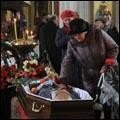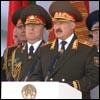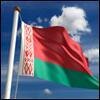Другие материалы рубрики «English»
-
 Hundreds of mourners pay last respects to poet Nil Hilevich
Hundreds of mourners pay last respects to poet Nil Hilevich
Hundreds of people visited the Saints Peter and Paul Cathedral in Minsk on Friday to pay their last respects to renowned poet Nil Hilevich who passed away at the age of 84 on March 29. -
 Renowned poet Nil Hilevich dies aged 84
Renowned poet Nil Hilevich dies aged 84
Renowned Belarusian poet Nil Hilevich, the last surviving holder of the People's Poet title, has died aged 84.
- Opposition organizations drawing up preliminary lists of parliamentary hopefuls
- Five-year social and economic development to be adopted at All-Belarusian People’s Assembly
- Lukashenka said to have won with 83.49 percent
- Lukashenka warns of crackdown on further unsanctioned opposition protests
- Karatkevich votes for herself
- Rescuers stage massive exercise at sports center in Minsk
- Revelers in Minsk celebrate end of Butter Week
- Leaders of France, Germany, Russia, Ukraine arrive in Minsk for summit on Ukraine crisis
- United Kingdom’s Visa Application Center in Minsk moves into permanent office
- Minsk residents paying tribute to victims of Charlie Hebdo massacre in Paris
English
Twenty years since adoption of State Sovereignty Declaration
It is 20 years on Tuesday since the Supreme Soviet, the legislature of the Byelorussian Soviet Socialist Republic (BSSR), adopted the Declaration of State Sovereignty of the BSSR to assert the country’s independence from the Soviet Union, BelaPAN reports.
 Adopted on July 27, 1990, some two weeks after Russia declared its own sovereignty, the Declaration started the process to Belarus' eventual independence in August 1991. Until 1996, the 27th of July was celebrated as Independence Day in Belarus.
Adopted on July 27, 1990, some two weeks after Russia declared its own sovereignty, the Declaration started the process to Belarus' eventual independence in August 1991. Until 1996, the 27th of July was celebrated as Independence Day in Belarus.
On August 25, 1991, the Declaration was given the status of a constitutional law, which was used as the basis for amendments to the 1978 BSSR constitution.
On September 19, 1991, the Supreme Soviet adopted a law that changed the name of the country for the Republic of Belarus and introduced new state symbols – the white-red-white flag and the Pahonya emblem.
At their meeting at the Belarusian government residence in Viskuli, Brest region, on December 8, 1991, the leaders of Belarus, Russia and Ukraine – Stanislaw Shushkevich, Boris Yeltsin and Leonid Kravchuk – denounced the 1922 Treaty on the Formation of the USSR.
The constitution of the Republic of Belarus was adopted on March 15, 1994.
As a result of a May 1995 national referendum, initiated by Alyaksandr Lukashenka, who was elected president in the summer of 1994, the new state symbols were replaced with Soviet-style ones and Russian was given the status of a state language.
The constitution currently in force in Belarus was adopted through another Lukashenka-initiated referendum in 1996. Although the 1996 constitution is represented by government officials as an amended version of the 1994 constitution, it is in fact a different constitution. The 1996 constitution sealed Mr. Lukashenka`s monopolization of state power, giving him quasi-dictatorial powers. Although formally the separation of powers still exists in Belarus, under the 1996 constitution, the president overwhelmingly dominates the other branches of government.
If the 1994 constitution had been in force in the country, the “Belarusians would have had a different life,” said Dr. Shushkevich, who was first deputy chairman of the BSSR Supreme Soviet when the Declaration of State Sovereignty was adopted.
The Minsk office of the Belarusian Popular Front (BPF) on Monday evening hosted a “roundtable” discussion on the occasion of the coming anniversary.
Aleh Trusaw, chairman of the Francisak Skaryna Belarusian Language Association who was a member of the Supreme Soviet in 1991, said, “Belarus’ return to independence began 20 years ago.” It was opposition members of the Soviet who lobbied for the inclusion of many provisions regarding Belarusian values in the Declaration, Mr. Trusaw said.
Opposition activist Vyachaslaw Siwchyk noted the sweeping changes in the Belarusian people’s sentiments in the late 1980s and early 1990s. “It was the time when some part of the population eventually understood that it was high time to assert the country’s independence,” he said.
The gathering shared the opinion that Belarus’ Independence Day should be observed on July 27. “On this day, the national cause became the bottom of all democratic changes in the life of the country,” said Alyaksey Yanukevich, chairman of the BPF.




В настоящее время комментариев к этому материалу нет.
Вы можете стать первым, разместив свой комментарий в форме слева